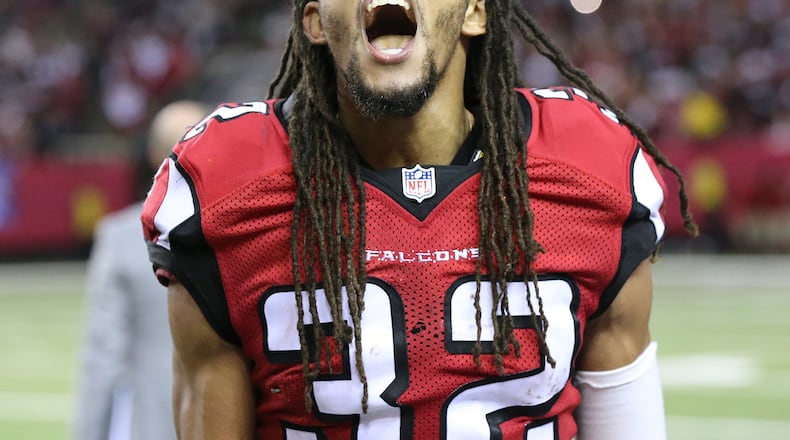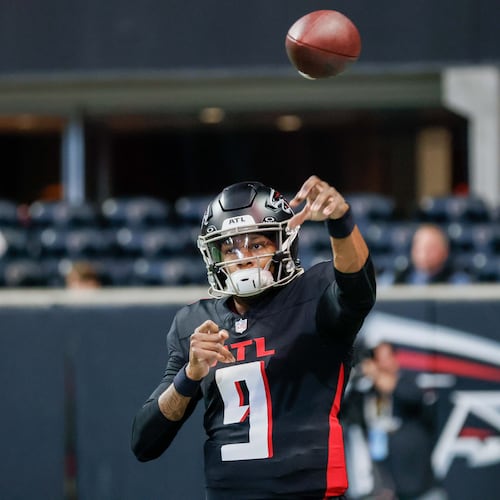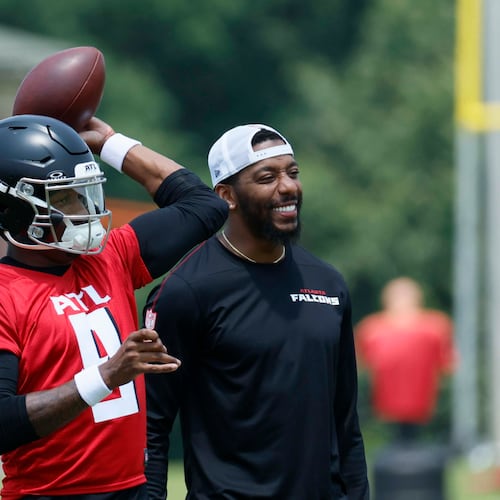On the day the NFL season opened, Jalen Collins went bowling.
Well, not right away. He hung around his apartment with his girlfriend, turned on the Falcons’ game and watched for a little while. But he couldn’t make it through a quarter.
“We went to bowl, but the place had projectors up so you watch the game if you wanted,” Collins said. “I checked it out a little, but I was kind of in and out. It’s tough to stay locked in when you’re not playing.”
But there was this: “I bowled pretty good.”
On Sunday, Collins wasn’t in and out. Just in. If you’re wondering how this Falcons defense has managed to improve in the second half of the season, enabling a Super Bowl run, despite the loss of Desmond Trufant, it starts with unexpected developments such as Collins’ recent success.
The same player who was suspended for the first four games of the season, the same player who didn’t suit up for the first seven games or play a defensive snap until the ninth — and then only because of injury — made the defensive play that jump-started the Falcons’ to their 44-21 rout of the Green Bay Packers.
Collins ripped the ball out of the hands of fullback Aaron Ripkowski at the Falcons’ 11-yard line and then chased the bouncing ball into the end zone for the recovery, preventing a likely touchdown drive that would’ve trimmed the Falcons’ lead to 10-7. Instead, the Falcons turned that turnover into a touchdown and go up 17-0.
“He made the play that got it started,” Dwight Freeney said.
Talent never was the problem for Collins. If it were about talent alone, he might have been a top-10 draft pick out of LSU. But he dropped to the Falcons in the second round (42nd overall) for a few reasons. Some believed he underperformed in college, relative to his talent. There were three failed drug tests (marijuana). There was a the pre-draft discovery of a small crack in his foot, requiring surgery.
The Falcons took a leap on Collins, but he followed that with a subpar rookie season in 2015. Then came the four-game suspension in April for testing positive for a performance enhancing drug (Adderall, according to a source).
Coach Dan Quinn admitting this week, “I had concerns,” about Collins’ future.
He has disputed as “100 percent false” a report from a Milwaukee newspaper that he opposed the Falcons drafting Collins and that the selection was pushed on him by general manager Thomas Dimitroff. (The Quinn-Dimitroff partnership and Quinn’s control over the roster also makes the story’s scenario unlikely.)
“We knew he had the speed, the length and we knew what he stood for,” Quinn said. “But we wanted to make sure he could get his world in order. That meant on the field and off the field, and it was going to take a lot of work.”
Quinn designated Collins inactive for the first three out of four games even after the suspension, and Collins played on special teams in the other one. Simply, Quinn didn’t believe he had earned a spot yet. Collins started to play only after Trufant’s season-ending pectoral injury. Suddenly, he was a starter.
“To have it where it was taken away from you, it’s a hard thing,” Quinn said. “But I wanted to let him know I believe in him. It was going to be really hard. There were going to be challenges along the way. But if you put the time in, which he still does today because it’s not like (his problem) is a one-and-done thing, it has to be on a regular basis. … I couldn’t be more proud of him.”
Collins was allowed to come to training camp and play in the preseason. He did so knowing that as soon as the season started, he couldn’t play, nor even come to the practice facility.
“It sucks, man,” he said when asked about that period. “You prepare all week to play, but then you’re told you have to take four weeks off. It was really tough to deal with.”
When Quinn didn’t play him right away, he talked to Collins to try to keep him up emotionally. “He told me, keep grinding, that we’re going to need you at some point,” Collins said.
Collins had interceptions in divisional wins over Carolina and New Orleans and was credited with 10 pass breakups in eight games (six starts). But the strip and recovery against Green Bay has been his highlight. The play was referenced by teammates and coaches after the game, and Collins was invited on Fox’s postgame show stage that was set up in the Georgia Dome as confetti fell on the field.
“Just to be in that position in my second year was great, but to be able to do something like that, it was special, especially after all of the stuff I’ve gone through, being in some trouble,” Collins said. “I felt I had to give something back to the guys, what I felt I had taken away from them.”
Asked about maturity, he said, “I’ve grown a tremendous amount. I’m getting down to the core of what I need to deal with, taking care of that, having my friends and family around me to support me. It’s doing great things for me.”
If he could travel back in time, what would he tell his younger self at LSU?
“Stay out of trouble,” he said.
Subscribe to the, “We Never Played The Game” podcast with Jeff Schultz and WSB’s Zach Klein on iTunes. All episodes also can be downloaded and heard on iTunes or via WSBRadio.com. Two new episodes every week.
About the Author
Keep Reading
The Latest
Featured



